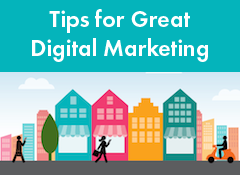 A man walks into a bar/restaurant/hotel/car repair shop. Chances are, he found it online. That’s because today’s consumers, 80% according to Google, rely more on the Web to find and choose local businesses.
A man walks into a bar/restaurant/hotel/car repair shop. Chances are, he found it online. That’s because today’s consumers, 80% according to Google, rely more on the Web to find and choose local businesses.
So how do you make sure that these consumers find and choose your local business? By using a mix of these four strategies for great digital marketing: search advertising, website, search engine optimization, and social media. Here are 30 tips to get you going.
Search Advertising Tips
1. Identify and follow the rules of Bing, Yahoo!, and Google search ads before running your campaign as all have slightly different formats.
2. Optimize the URL displayed in your search ad so that it’s relevant to the product or service you are promoting.
3. Include target keywords in your headlines and copy that either match or closely match the keywords you bid on in order to boost the chance that your ad appears for those terms.
4. Write strong calls to action for your search ads that directly state what you want consumers to do. For example “Contact for a Free Estimate” or “Get a 50% Coupon.”
5. When using a click-to-call extension, consider using a tracking number so that you can identify and measure which ads perform the best.
6. Don’t spend precious text ad character count on your business name. It should already be in your optimized URL.
7. Do capitalize the first letter of major words in your ad. Don’t (read “NEVER”) go crazy with all caps.
8. Should you use correct punctuation in text ads? Yes! It just makes good sense.
9. Using trademarks in text ad copy is a no-no unless, of course, you own them. You can, however, bid on terms relevant to your business.
10. DUUA (don’t use unknown abbreviations). While it could pique the interest of a few searchers, why take that chance?
Website Tips
11. If you haven’t updated your website since 2010, do it now. A clean, modern design is key in digital marketing, plus it ensures that you meet today’s best practices and Web standards.
12. Make your website mobile-friendly! The 2014 Local Search Study results indicate that nearly 80% of local mobile searches end in a purchase. This is a big audience you shouldn’t ignore.
13. Accurately complete your site’s metadata (title tags, descriptions, alt text, etc.). Not doing so can negatively impact your visibility on SERPs.
14. A business blog is a winning addition to your website. It can help boost your site’s SEO, set you apart from the competition, and demonstrate your knowledge and expertise. It’s a win-win situation.
15. In order to get found by local consumers, you need to optimize your site with local information like your address and geo-targeted keywords.
Search Engine Optimization
16. Having a business blog is useless if you don’t regularly create and promote original and sharable content to help prove relevance and therefore rank in search engines.
17. Enable share buttons on your blog so that readers can easily post your content to their social media pages and drive visitors back to your website.
18. Optimize your Google+ Local page to help your business name, phone number, location, and even opening hours show up in Google Maps and Google’s local search results.
19. Much like Google+ Local, Yelp is platform to complete and post information about your business. More importantly, it helps feed Apple Maps with local business results.
20. Include geo-specific keywords, such as your city, neighborhood, and zip codes, in your website, blog, and even social media copy to appear in search results for these terms.
19. Don’t only promote blog posts once. Repurpose them as engaging images, quotes, or questions in order to generate additional views, shares, and subject relativity.
21. Getting backlinks from influencers and other industry-related websites that have already established credibility are great for building your own authority and driving more visits back to your site.
23. Enable Google Authorship to help build your personal brand. By establishing yourself as a subject matter expert, you can share your own content, generate more shares, and drive more website visits.
22. Since positive reviews rank in search engine results, generate positive reviews with high rankings to help persuade consumers to choose your business.
26. Once you receive positive reviews, promote them on your website and social media sites so that consumers who search for you business on social sites or local directories see the great things others say about your business.
25. Images can help sell your business, and they also rank in search engines. Don’t name your images “photo.jpg,” and instead name them more descriptively, add alt text, or captions on your website to help images show up in search results.
Social Media
27. Think, review, and review again before you make a social media post or comment. The ability to easily take screenshots makes it difficult to take back a social media mistake.
28. Since your employees also represent your brand, both in person and online, implement a social media policy that at the least permits them from sharing internal information.
29. Before you jump on a trending hashtag, make sure you know the origin of it. Not doing so can potentially cause social media regrets.
30. Like it or not, you “share” your brand on social media. And since consumers can start good and bad conversations about you, make sure to set up alerts that notify you of new mentions, comments, or messages.
